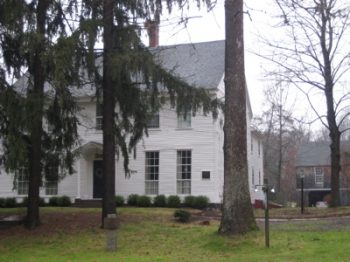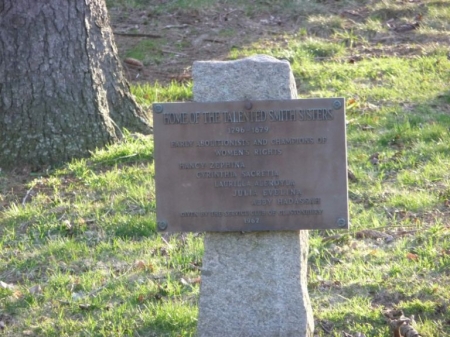Kimberly Mansion
CT National Historic Landmark
1625 Main Street, Glastonbury (Private Residence)
I stopped by this house for the purposes of the CT Freedom Trail. I really enjoyed learning the story then, and re-reading about it now. Therefore I’ll repeat the whole thing again here. Bonus: A picture of the little sign in front!

The following is all Wikipedia stuff.
Kimberly Mansion was the home of Abby and Julia Evelina Smith, political activists involved in causes including abolitionism and women’s suffrage. By contesting the assessment on their property and protesting against “taxation without representation” they brought international attention to the cause of Women’s rights.
The Smith family hosted abolitionist meetings and lectures at their home and on their lawn. They collected signatures for an anti-slavery petition and sent it to former president John Quincy Adams to present to Congress.
In 1873, late in their lives, they became tax resisters when they began a two year fight with local authorities over an inequitable property tax assessment on their property, Kimberly Farm. They owned the most valuable property in town and were being exploited by the town tax collector. In Connecticut at the time, women had no vote and thus no voice in the disposition of their taxes. They refused to pay their tax until they were given representation. Abby took their concerns to the town council where she said:
The motto of our government is ‘Proclaim liberty to all inhabitants of the land!’ and here, where liberty is so highly extolled and glorified by every man in it, one-half of the inhabitants are not put under her laws, but are ruled over by the other half, who can take all they possess. How is Liberty pleased with such worship?
The town responded by seizing their beloved Alderney cows, auctioning them off and attempting to auction their farm as well. The sisters were able to buy the cows back and fought the town in court, ultimately winning. The case brought attention to the sisters, their cows and the cause of women’s suffrage.

The sisters came from an accomplished and nonconformist family. The sisters parent’s were Zephaniah Smith, a lawyer and former Sandemanian minister and Hannah Hickok, an amateur mathematician and poet. There were three other sisters: Hancy, an inventor; Laurilla, an artist and Cyrinthia, a poet. Julia also knew classical languages and in 1855, she finished the first complete translation of the Bible into English by a woman. She published the translation herself in 1876 as an example of the accomplishments that women are capable of.
The house was declared a National Historic Landmark in 1974. The large wooden two-story farmhouse, also known as the Smith Sisters House, was built in the early 18th century by the Connecticut politician, Eleazer Kimberly. Zephaniah Smith bought the house in 1790.
![]()
CTMQ visits CT’s National Historic Landmarks

Leave a Reply